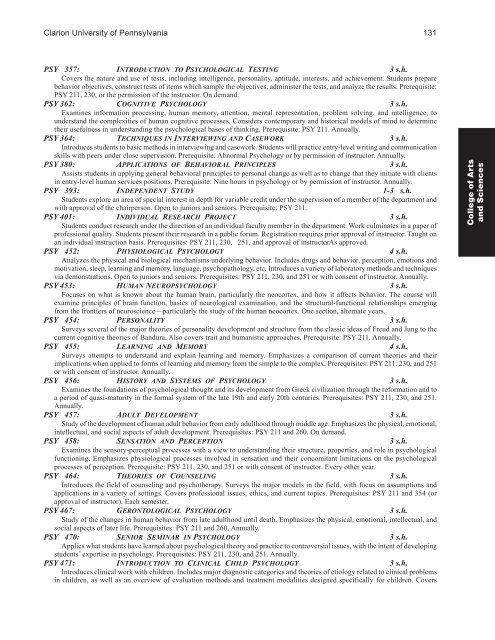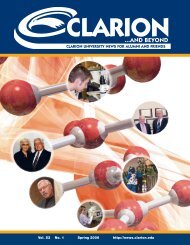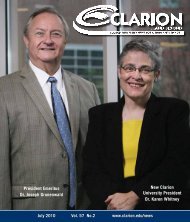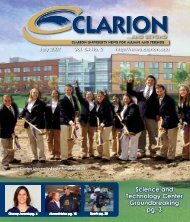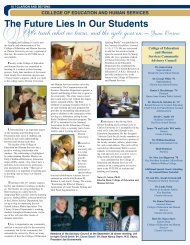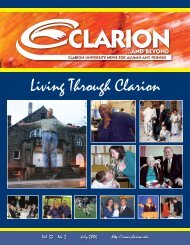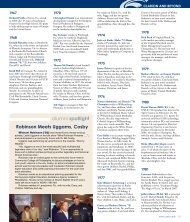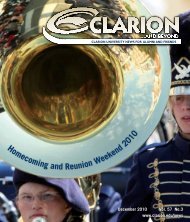Undergraduate - Clarion University
Undergraduate - Clarion University
Undergraduate - Clarion University
You also want an ePaper? Increase the reach of your titles
YUMPU automatically turns print PDFs into web optimized ePapers that Google loves.
<strong>Clarion</strong> <strong>University</strong> of Pennsylvania 131<br />
PSY 357: INTRODUCTION TO PSYCHOLOGICAL TESTING 3 s.h.<br />
Covers the nature and use of tests, including intelligence, personality, aptitude, interests, and achievement. Students prepare<br />
behavior objectives, construct tests of items which sample the objectives, administer the tests, and analyze the results. Prerequisite:<br />
PSY 211, 230, or the permission of the instructor. On demand.<br />
PSY 362: COGNITIVE PSYCHOLOGY 3 s.h.<br />
Examines information processing, human memory, attention, mental representation, problem solving, and intelligence, to<br />
understand the complexities of human cognitive processes. Considers contemporary and historical models of mind to determine<br />
their usefulness in understanding the psychological bases of thinking. Prerequisite: PSY 211. Annually.<br />
PSY 364: TECHNIQUES IN INTERVIEWING AND CASEWORK 3 s.h.<br />
Introduces students to basic methods in interviewing and casework. Students will practice entry-level writing and communication<br />
skills with peers under close supervision. Prerequisite: Abnormal Psychology or by permission of instructor. Annually.<br />
PSY 380: APPLICATIONS OF BEHAVIORAL PRINCIPLES 3 s.h.<br />
Assists students in applying general behavioral principles to personal change as well as to change that they initiate with clients<br />
in entry-level human services positions. Prerequisite: Nine hours in psychology or by permission of instructor. Annually.<br />
PSY 393: INDEPENDENT STUDY 1-3 s.h.<br />
Students explore an area of special interest in depth for variable credit under the supervision of a member of the department and<br />
with approval of the chairperson. Open to juniors and seniors. Prerequisite: PSY 211.<br />
PSY 401: INDIVIDUAL RESEARCH PROJECT 3 s.h.<br />
Students conduct research under the direction of an individual faculty member in the department. Work culminates in a paper of<br />
professional quality. Students present their research in a public forum. Registration requires prior approval of instructor. Taught on<br />
an individual instruction basis. Prerequisites: PSY 211, 230, 251, and approval of instructor . As approved.<br />
PSY 452: PHYSIOLOGICAL PSYCHOLOGY 4 s.h.<br />
Analyzes the physical and biological mechanisms underlying behavior. Includes drugs and behavior, perception, emotions and<br />
motivation, sleep, learning and memory, language, psychopathology, etc. Introduces a variety of laboratory methods and techniques<br />
via demonstrations. Open to juniors and seniors. Prerequisites: PSY 211, 230, and 251 or with consent of instructor. Annually.<br />
PSY 453: HUMAN NEUROPSYCHOLOGY 3 s.h.<br />
Focuses on what is known about the human brain, particularly the neocortex, and how it affects behavior. The course will<br />
examine principles of brain function, basics of neurological examination, and the structural-functional relationships emerging<br />
from the frontiers of neuroscience—particularly the study of the human neocortex. One section, alternate years.<br />
PSY 454: PERSONALITY 3 s.h.<br />
Surveys several of the major theories of personality development and structure from the classic ideas of Freud and Jung to the<br />
current cognitive theories of Bandura. Also covers trait and humanistic approaches. Prerequisite: PSY 211. Annually.<br />
PSY 455: LEARNING AND MEMORY 4 s.h.<br />
Surveys attempts to understand and explain learning and memory. Emphasizes a comparison of current theories and their<br />
implications when applied to forms of learning and memory from the simple to the complex. Prerequisites: PSY 211, 230, and 251<br />
or with consent of instructor. Annually.<br />
PSY 456: HISTORY AND SYSTEMS OF PSYCHOLOGY 3 s.h.<br />
Examines the foundations of psychological thought and its development from Greek civilization through the reformation and to<br />
a period of quasi-maturity in the formal system of the late 19th and early 20th centuries. Prerequisites: PSY 211, 230, and 251.<br />
Annually.<br />
PSY 457: ADULT DEVELOPMENT 3 s.h.<br />
Study of the development of human adult behavior from early adulthood through middle age. Emphasizes the physical, emotional,<br />
intellectual, and social aspects of adult development. Prerequisites: PSY 211 and 260. On demand.<br />
PSY 458: SENSATION AND PERCEPTION 3 s.h.<br />
Examines the sensory-perceptual processes with a view to understanding their structure, properties, and role in psychological<br />
functioning. Emphasizes physiological processes involved in sensation and their concomitant limitations on the psychological<br />
processes of perception. Prerequisite: PSY 211, 230, and 251 or with consent of instructor. Every other year.<br />
PSY 464: THEORIES OF COUNSELING 3 s.h.<br />
Introduces the field of counseling and psychotherapy. Surveys the major models in the field, with focus on assumptions and<br />
applications in a variety of settings. Covers professional issues, ethics, and current topics. Prerequisites: PSY 211 and 354 (or<br />
approval of instructor). Each semester.<br />
PSY 467: GERONTOLOGICAL PSYCHOLOGY 3 s.h.<br />
Study of the changes in human behavior from late adulthood until death. Emphasizes the physical, emotional, intellectual, and<br />
social aspects of later life. Prerequisites: PSY 211 and 260. Annually.<br />
PSY 470: SENIOR SEMINAR IN PSYCHOLOGY 3 s.h.<br />
Applies what students have learned about psychological theory and practice to controversial issues, with the intent of developing<br />
students’ expertise in psychology. Prerequisites: PSY 211, 230, and 251. Annually.<br />
PSY 471: INTRODUCTION TO CLINICAL CHILD PSYCHOLOGY 3 s.h.<br />
Introduces clinical work with children. Includes major diagnostic categories and theories of etiology related to clinical problems<br />
in children, as well as an overview of evaluation methods and treatment modalities designed specifically for children. Covers<br />
College of Arts<br />
and Sciences


